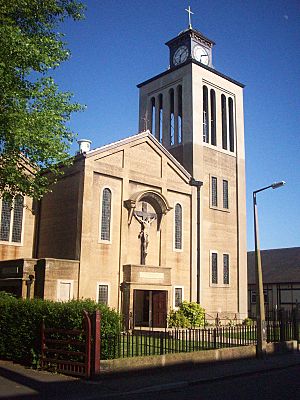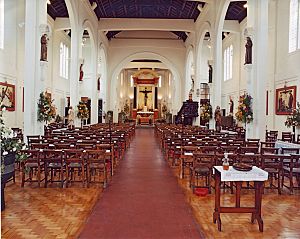St John and St Mary Magdalene Church, Goldthorpe facts for kids
Quick facts for kids The Church of St John the Evangelist and St Mary Magdalene |
|
|---|---|
 |
|
| OS grid reference | SE 46352 04559 |
| Denomination | Church of England |
| Churchmanship | Anglo Catholic |
| Website | Parish of Goldthorpe and Hickleton |
| History | |
| Dedication | St John the Evangelist and St Mary Magdalene |
| Architecture | |
| Architect(s) | Alfred Young Nutt |
| Administration | |
| Parish | Goldthorpe |
| Diocese | Sheffield |
| Province | York |
The Church of St John the Evangelist and St Mary Magdalene is a special church in Goldthorpe, a village near Barnsley, South Yorkshire, England. It belongs to the Church of England and is part of the Diocese of Sheffield. This church is known for its unique design and history.
Contents
About the Church Building
A Unique Design and Material
The Church of St John the Evangelist and St Mary Magdalene was built in 1916. It was one of the first large buildings in England to use a material called ferro-concrete. This is a type of concrete that has metal bars inside it to make it extra strong. Today, it is a Grade II listed building, which means it is an important historical building that needs to be protected.
Who Commissioned It?
The church was asked for by Charles Wood, 2nd Viscount Halifax. He was a very important person who used to own Hickleton Hall, a large estate nearby. The church was designed in 1914 by an architect named Alfred Young Nutt. He had worked for St George's Chapel, Windsor before this project.
An Unusual Style
The church has a very unusual Italian style. This is quite different from other buildings in the Dearne Valley, which was a coal mining area. It stands out in the village of Goldthorpe because of its unique look.
Building with Concrete
This church was groundbreaking because almost everything was made from reinforced concrete. This included the main parts of the church inside, the house for the priest (called the Presbytery), and even the walls around the churchyard.
However, because it was an early experiment, the concrete allowed water to get in. This caused the metal inside the walls to rust over time. By the 1990s, the church needed a lot of repairs. The Heritage Lottery Fund helped pay for these big repairs. The church was officially opened again in June 2002 after the work was finished.
Inside the Church
Main Areas of the Church
The church has several important areas inside. It has a tower on the southwest side, a porch, and a gallery at the west end. There is a large main area called the Nave, with side sections called North and South Aisles. At the front, there is a Chancel with a rounded end called an Apse. There is also a special Lady Chapel on the south side and rooms for the clergy (priests) called vestries on the north side.
Special Decorations
Viscount Halifax, who commissioned the church, was an Anglo-Catholic. This means he liked church decorations that were similar to those found in Roman Catholic churches. The church has Italian-style details, like a classical baldacchino (a canopy over the altar). This canopy is held up by four black pillars with shiny gold tops. Underneath it, there is a large Crucifix (a cross with Jesus on it) that is a copy of a famous artwork by Donatello.
The Bell Tower and Pulpit
The church's tower is a campanile, which is a tall, slender bell tower often seen in Italy. It has a clock with four faces, each six feet wide. There used to be special chimes that could be rung, but they were removed in the 1950s.
According to a famous expert named Pevsner, the pulpit (where the priest gives sermons) was bought in 1931 and is from the 18th century, made in the Flemish style.
Past and Present Features
The church used to have a smaller chapel nearby called St Michael's. This chapel closed in 1983, and its altar and crucifix were moved into the main church, under the tower. In 2006, a beautiful stained glass window was added. It shows pictures that remember the village's history of coal mining.
The Lady Chapel's Secret
Hidden Treasures
The Lady Chapel is a smaller chapel located in the south-east part of the church. It is dedicated to St John and St Mary. During the church's repairs in 2002, two paintings hanging above the altar were found to be very old and valuable. They were painted by a famous Italian artist named Sano di Pietro. These paintings were worth a lot of money, about £300,000! They were moved to York Minster for safekeeping.
The Church Today
The Church of St John the Evangelist and St Mary Magdalene works closely with St Wilfrid's Church in the nearby village of Hickleton. They share their pastoral care, meaning they work together to serve their communities.
See also


